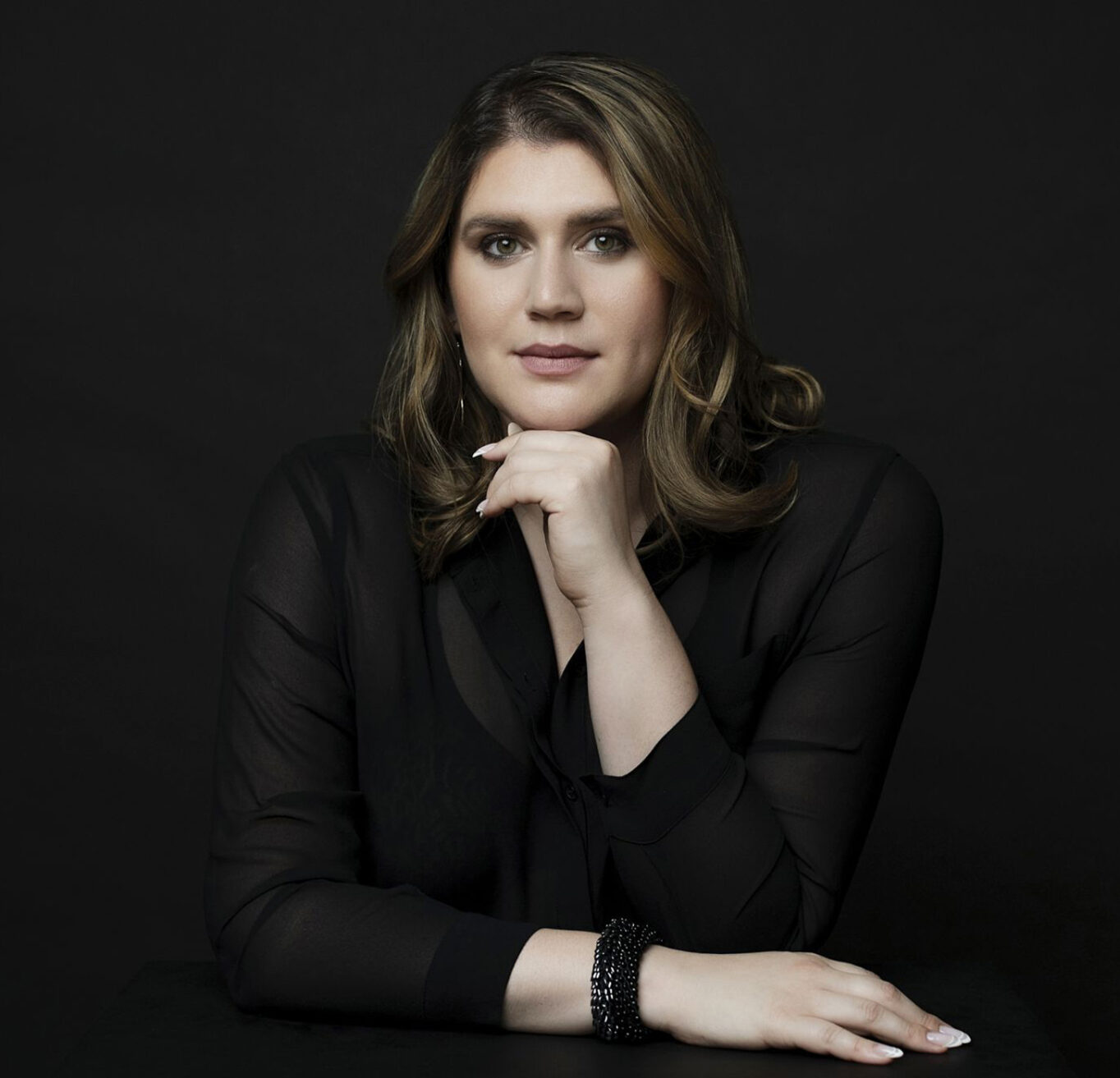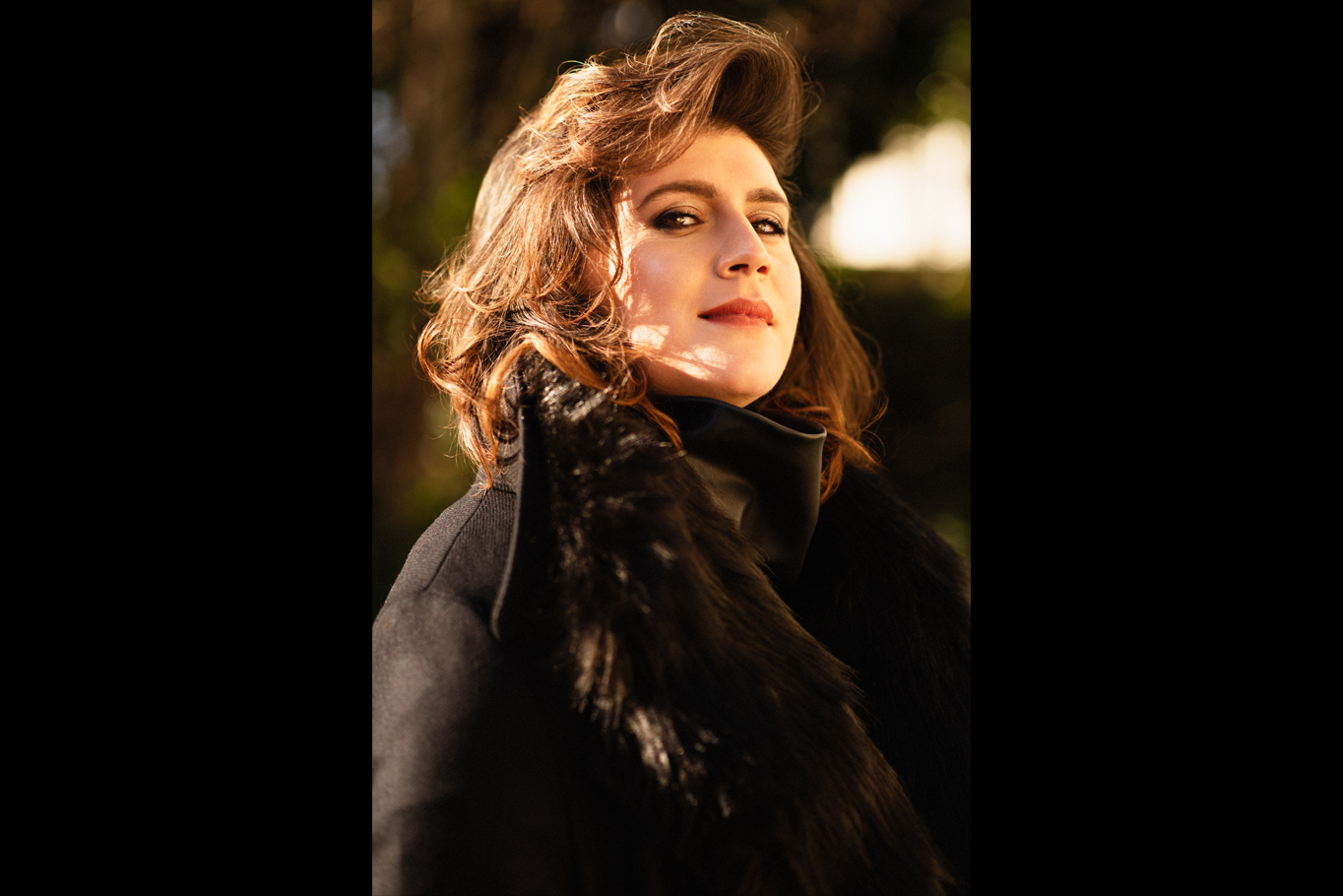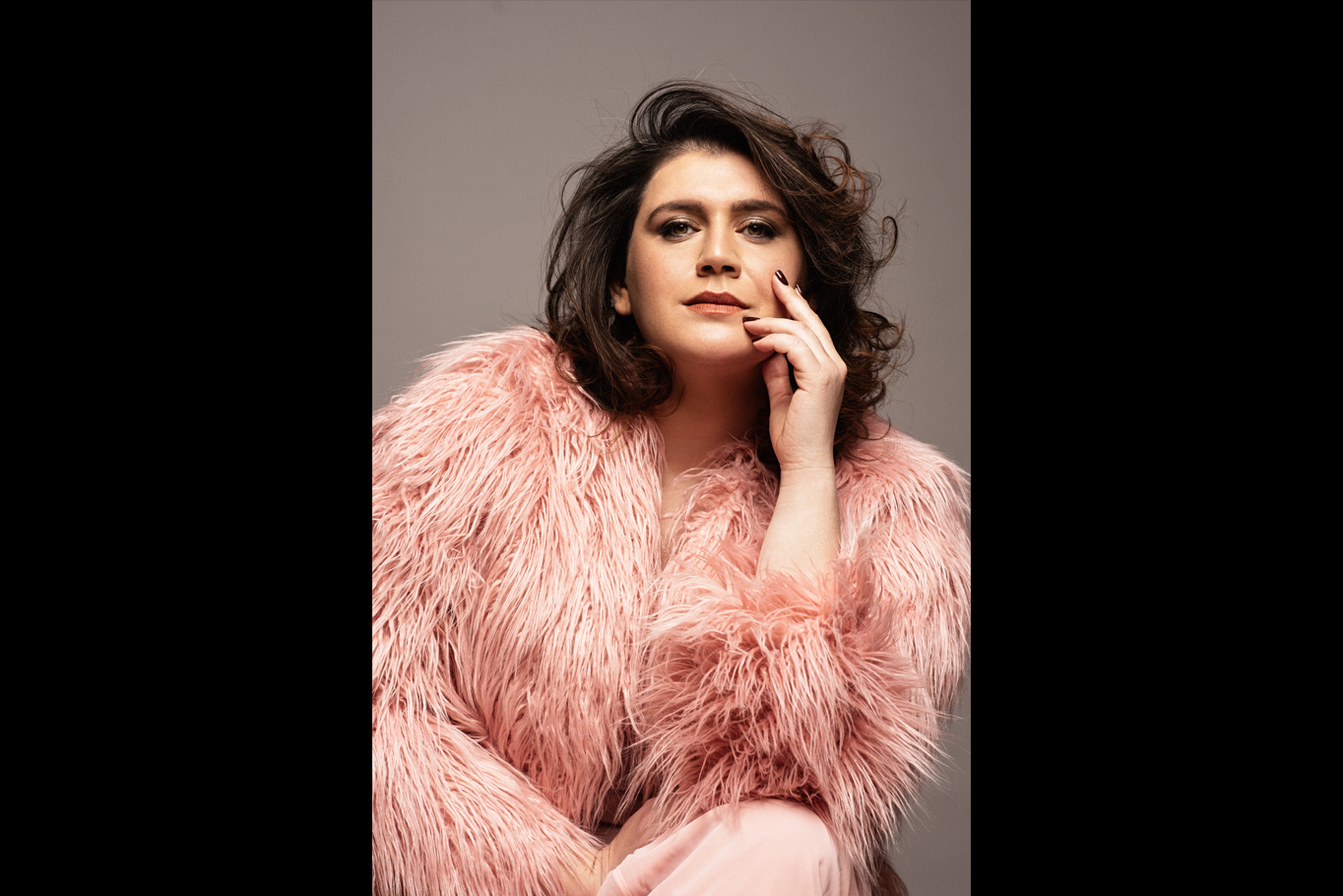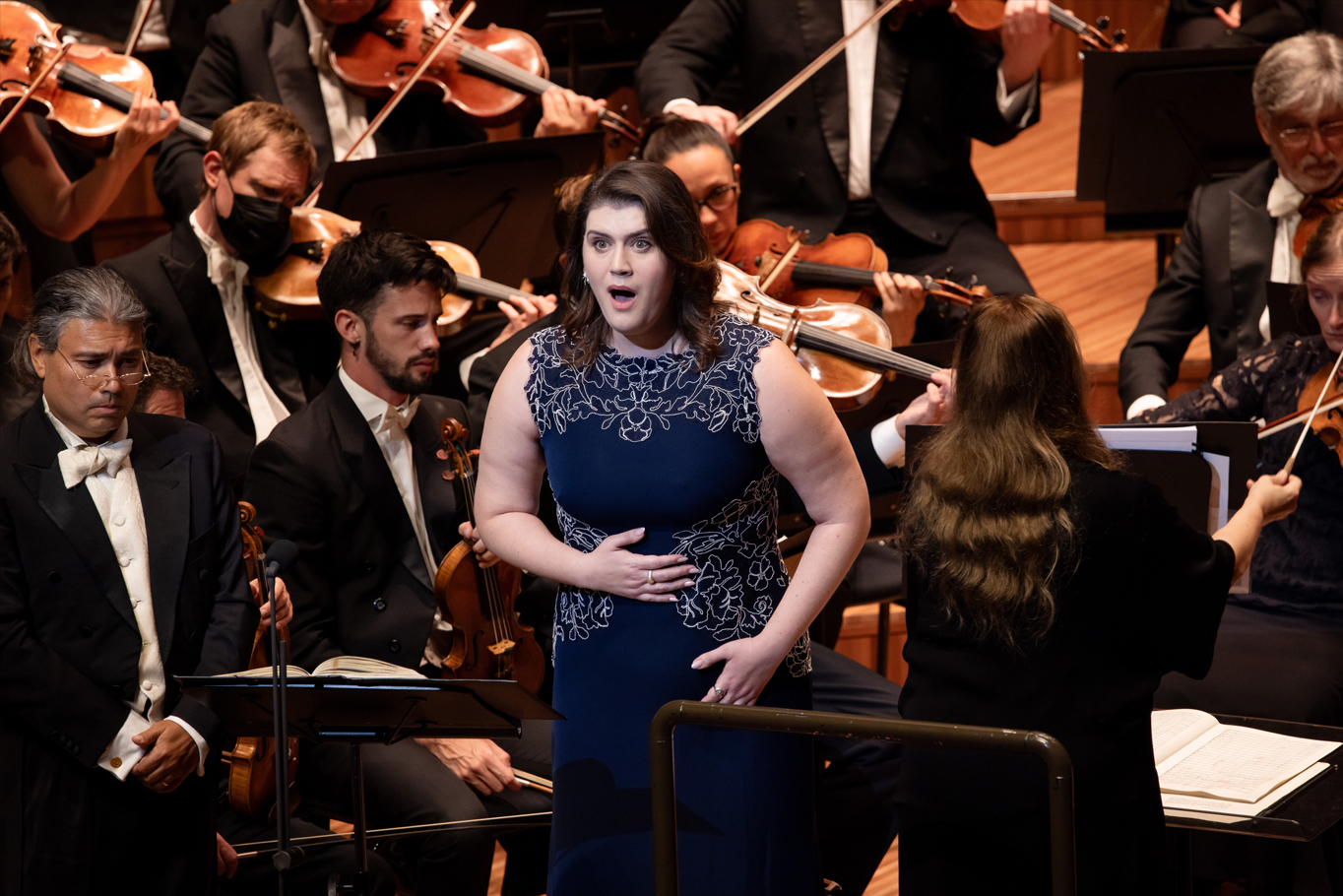
Noa Beinart on Mahler, Wagner, Simone Young and Sydney
13 February, 2025
Noa Beinart made an unforgettable Sydney debut in Das Rheingold, but this city – and our Orchestra – made quite an impression on her, too. She is making the trip twice in 2025, and shares how excited she is to reacquaint herself with the city, the Orchestra, and especially the audience.
By Hugh Robertson
Of all the many unforgettable moments from Simone Young’s first three seasons as Chief Conductor of the Sydney Symphony Orchestra, perhaps none made such an impact as Noa Beinart’s first appearance during Das Rheingold.
She appeared in the middle of the Orchestra as if by magic; statuesque and striking, with her rich, powerful voice embodying the earth goddess Erda, warning the king of the gods about his arrogance and hubris. Everyone sitting in the Concert Hall felt the magnitude of that moment; it must rank among the most impactful Sydney debut performances of all time.
In 2025 Beinart will make the long journey to Sydney twice: to once again portray Erda in Siegfried, the third of the Ring operas, but also starring as soloist in Mahler’s Third Symphony which opens our Season.
Ahead of her return to Sydney, we spoke to Noa about her love of Wagner and Mahler, the thrill of working with Simone Young, and the energy that she felt from Sydney audiences following Das Rheingold.

When did you first fall in love with music?
I started singing at a very young age. My mum says I begged to go and sing in the choir, which I don't remember, but I was in a children's choir for about 11 years from the age of eight. That was my first introduction. I just loved it so much. I learned so much about the stage itself, what it is to be in a group, what it requires, the discipline.
That was my introduction with singing, but I think I really fell in love with classical music when I was a teenager. I went to an arts high school and we had many different arts, and there was the first piano concerto I ever heard was Rachmaninov’s Second – and I remember just being so in awe. That was when I realized that I wanted to be a part of classical music. I wanted to create music.
And later I realised that I could do it myself with my voice and make a career out of it.
How did things develop from there? What were the years between high school and your professional debut like?
I met a teacher when I was 18 who told me, ‘you are going to sing a lot of German repertoire – that's kind of your thing – so you should go and study in Germany. You should speak the language.’ Which was probably the best singing advice I ever got.
So I moved to Germany at the first opportunity I could, I got into a college for music in Berlin and started singing. But the first thing you realize is everybody's talented, and so it was very unclear as to if I could do it, and in what way, and what was the right way to do it. It seemed all very ambiguous.
It was only a bit later, maybe when I was 24 or 25, that I realised I could pursue this as a career.

What there a point when you had to make decisions about what repertoire you were going to sing? Some singers take years to train their voice specifically for Wagner’s operas.
I think generally you train singing, you don't necessarily train fach [a German term that refers to the vocal range, weight, and colour of opera singers]. That's what I believe in and how I see my singing. I do sing a lot of German fach. I sing a lot of Wagner and I sing Strauss. But I also sing a lot of Baroque, I sing Handel, I sing Vivaldi – straight after I leave Sydney I'm off to Copenhagen to sing Griselda from Vivaldi.
I see it as one instrument. And I see that there is a natural path of where your voice wants to go. I think very clearly your voice shows on quite early. I think we have a sense of it. People see you or hear you and kind of feel, “I can hear you sing this repertoire, I can hear you sing this repertoire.” It's kind of hard to force it. You can, but it's difficult, I would say.
So the development felt very natural. I think my voice sits naturally in the German language; I enjoy how singing feels when I sing Wagner or German repertoire in general. It's to do with the language, it's to do with the musical language, it's to do with how, when you sing Wagner, the orchestra is the perfect base for whatever he wrote, whatever you're singing on top of it.
I remember when I sang Erda something kind of...clicked. I just enjoyed so much the music, the language of Wagner's music: what he writes, the harmonies, the word painting on every word. I found so much pleasure in it.
And it was wonderful singing Das Reingold with Simone Young and the Sydney Symphony. That orchestra can sing as well. They're wonderful.
What is it like to be conducted by Simone Young?
I met Simone for the first time when we did Peter Grimes in Vienna. It was the height of COVID and we weren't even sure that we were going to go on. Everybody was nervous, but I remember Simone saying to us “I will guide you through this. If you come with me, I'll take you on this journey.” And I remember realising that as true. I can trust Simone, she trusts me.
And making music with her…she takes you on a ride. She has a moment for everyone. I don't know how she does it. Every single person gets their cue, gets their moment and understands what she wants, but she’s driving the beast that is an opera just so gracefully and so precisely and so wonderfully.
I'm so calm when I perform with Simone because I know I'm well taken care of. And that's a really nice feeling. I felt it also when we did the Ring Cycle in Bayreuth, and then doing the Ring Cycle in Sydney: she invites the singers and the orchestra to join her in her musical vision. And it's beautiful what she does and it's a great pleasure to be a part of.

This will be your first time performing Mahler’s Third Symphony, is that correct?
It is my first time. It's kind of a dream come true, I have to say. It's on the list of dream performances and I'm so happy to do it in this context and with this orchestra and with Simone, it's so exciting. It's such a fantastic piece, an epic piece that is...hard to perform, requires a lot of people – like any Mahler symphony does.
The way that Mahler writes for the voice in the symphonies I feel is quite different than what he writes for songs, for example. I really feel that the soloists are one of the instruments in the orchestra.
And then also the way he writes harmonically, the way the text comes...He does the same in the Second Symphony where you have suddenly a solo movement after about an hour of music. So we've only heard the orchestra playing and suddenly we have this very, quite mysterious moment.
The text is also sung over such a long period of time. The words are repeated a lot. It's almost trance-like. I think it's a lot of overwhelming music for the listener. I think the first time I heard a Mahler symphony, was Mahler Nine, and I couldn't even understand what I was listening to – I was in such shock. But the more I've listened to Mahler in recent years, you really hear these moments of intimacy, these moments of clarity. I can listen to it all the time. I love it so much.
And are you looking forward to returning to Sydney?
I'm not just saying this, performing Das Rheingold in Sydney was the highlight of that season and probably one of the highlights ever for me.
We had lot of interactions with the audience when we did Rheingold. And generally, the audience after the show would also approach the singers and waited outside and wanted to talk. And I even got messages later from the audience, which was lovely.
The audience really loved Wagner. They enjoyed the performance. I love the fact that the audience feels like a part of that. I just loved how much they were involved. They talked to us. They had their opinions. It was exciting! And I remember everybody in the cast feeling like that. Very happy to be there. It's a great experience. When you say to anybody in the world that you are performing at the Sydney Opera House, that means something. It's iconic, and the acoustics that you have there are thrilling, absolutely stunning.
I really feel very honored to be able to come to Sydney. That's why I'm taking a 30,000-hour trip twice this year (laughs). I wanted to do it again. It takes forever to get over there. But now it's my obsession. I'm obsessed with Sydney. It's the best.
I told Simone – and I stand by it – that I'll do anything with her because it's a very special experience to perform with Simone. I'll do any chance I get, so I'm very happy to come twice this year.

